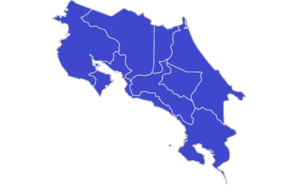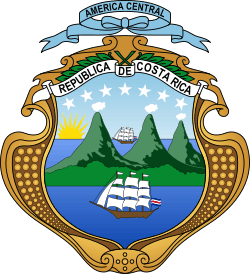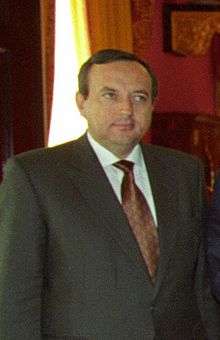1990 Costa Rican general election
General elections were held in Costa Rica on 4 February 1990.[1] Rafael Ángel Calderón Fournier of the Social Christian Unity Party won the presidential election, whilst his party also won the parliamentary election. Voter turnout was 81.8%.[2]
| |||||||||||||||||||||||||||||||
| Turnout | 81.8% | ||||||||||||||||||||||||||||||
|---|---|---|---|---|---|---|---|---|---|---|---|---|---|---|---|---|---|---|---|---|---|---|---|---|---|---|---|---|---|---|---|
|
| |||||||||||||||||||||||||||||||
Presidential election | |||||||||||||||||||||||||||||||
| |||||||||||||||||||||||||||||||
 Provinces won by Calderón | |||||||||||||||||||||||||||||||
| |||||||||||||||||||||||||||||||
Legislative election | |||||||||||||||||||||||||||||||
This lists parties that won seats. See the complete results below. | |||||||||||||||||||||||||||||||
 |
|---|
| This article is part of a series on the politics and government of Costa Rica |
|
Legislature
|
|
|
|
|
|
|
Unlike previous elections, Calderon's nomination was not undisputed. Despite expressing that he would not run again for President after the results of the previous race, he was eventually convinced by his followers. Yet, young former minister and business man Miguel Ángel Rodríguez Echeverría from the liberal faction inside PUSC choose to face Calderón at the primaries.[3][4] Former deputy José Hine from PUSC's left wing also run with testimonial results.
Despite the fact that Rodríguez clearly had no chance against Calderón, his candidacy was considered a smart move, as he would start to be in the spotlight and helping his way in future nominations.[5] As expected, Calderón won the primary election with 75% of the votes. On the other sidewalk former vice president Carlos Manuel Castillo won over young minister Rolando Araya Monge (nephew of ex-president Luis Alberto Monge) in PLN's primaries after a very hostile and traumatic campaign, in which Castillo even accused Araya of links with Narcotraffic, something that weakened PLN.[6] Minor parties proliferated in this election, with up to 12 different parties taking part, of which only left-wing coalition United People having some relevance with sociologist Victor Daniel Camacho as nominee earning 3% of the votes.
Results
President
| Candidate | Party | Votes | % |
|---|---|---|---|
| Rafael Ángel Calderón Fournier | Social Christian Unity Party | 694,589 | 51.5 |
| Carlos Manuel Castillo Morales | National Liberation Party | 636,701 | 47.2 |
| Víctor Daniel Camacho Monge | United People | 9,217 | 0.7 |
| Fernando Ramírez Muñoz | Christian National Alliance | 4,209 | 0.3 |
| Isaac Felipe Azofeifa | Progress Party | 2,547 | 0.2 |
| Edwin Badilla Agüero | Militant Workers Revolutionary Party | 1,005 | 0.1 |
| Rodrigo Alberto Cordero Víquez | Independent Party | 746 | 0.1 |
| Invalid/blank votes | 35,312 | - | |
| Total | 1,384,326 | 100 | |
| Source: Nohlen | |||
Parliament
| Party | Votes | % | Seats | +/- |
|---|---|---|---|---|
| Social Christian Unity Party | 617,478 | 46.2 | 29 | +4 |
| National Liberation Party | 559,632 | 41.9 | 25 | -4 |
| United People | 44,161 | 3.3 | 1 | 0 |
| Generaleña Union | 32,292 | 2.4 | 1 | +1 |
| Christian National Alliance | 22,154 | 1.6 | 0 | 0 |
| Cartago Agrarian Union Party | 14,190 | 1.1 | 1 | 0 |
| National Independent Party | 10,643 | 0.8 | 0 | New |
| Progress Party | 7,733 | 0.6 | 0 | New |
| Partido Alajuelense Solidario | 7,330 | 0.5 | 0 | -1 |
| Independent Party | 5,566 | 0.4 | 0 | 0 |
| Limonese Authentic Party | 4,901 | 0.4 | 0 | 0 |
| Agrarian Labour Action Party | 4,756 | 0.4 | 0 | New |
| Partido Agrario Nacional | 4,594 | 0.3 | 0 | New |
| Militant Workers Revolutionary Party | 742 | 0.1 | 0 | New |
| Invalid/blank votes | 47,784 | - | - | - |
| Total | 1,383,956 | 100 | 57 | 0 |
| Source: Nohlen | ||||
Ballot
References
- Nohlen, D (2005) Elections in the Americas: A data handbook, Volume I, p155 ISBN 978-0-19-928357-6
- Nohlen, p157
- Láscaris, Constantino (1965). "El desarrollo de las Ideas Filosóficas en Costa Rica". Retrieved 2019-09-16.
- "Rodríguez: balance final". La Nacion.
- Picado Leon, Hugo. "Proceso de selección de candid atos a presidente y diputados en el PLN y el PUSC (1990-2006)" (PDF). OPAL.
- Fernández, Oscar. "Costa Rica. La reafirmación del bipartidismo". Revista Nueva Sociedad. No.131: 4–10.


